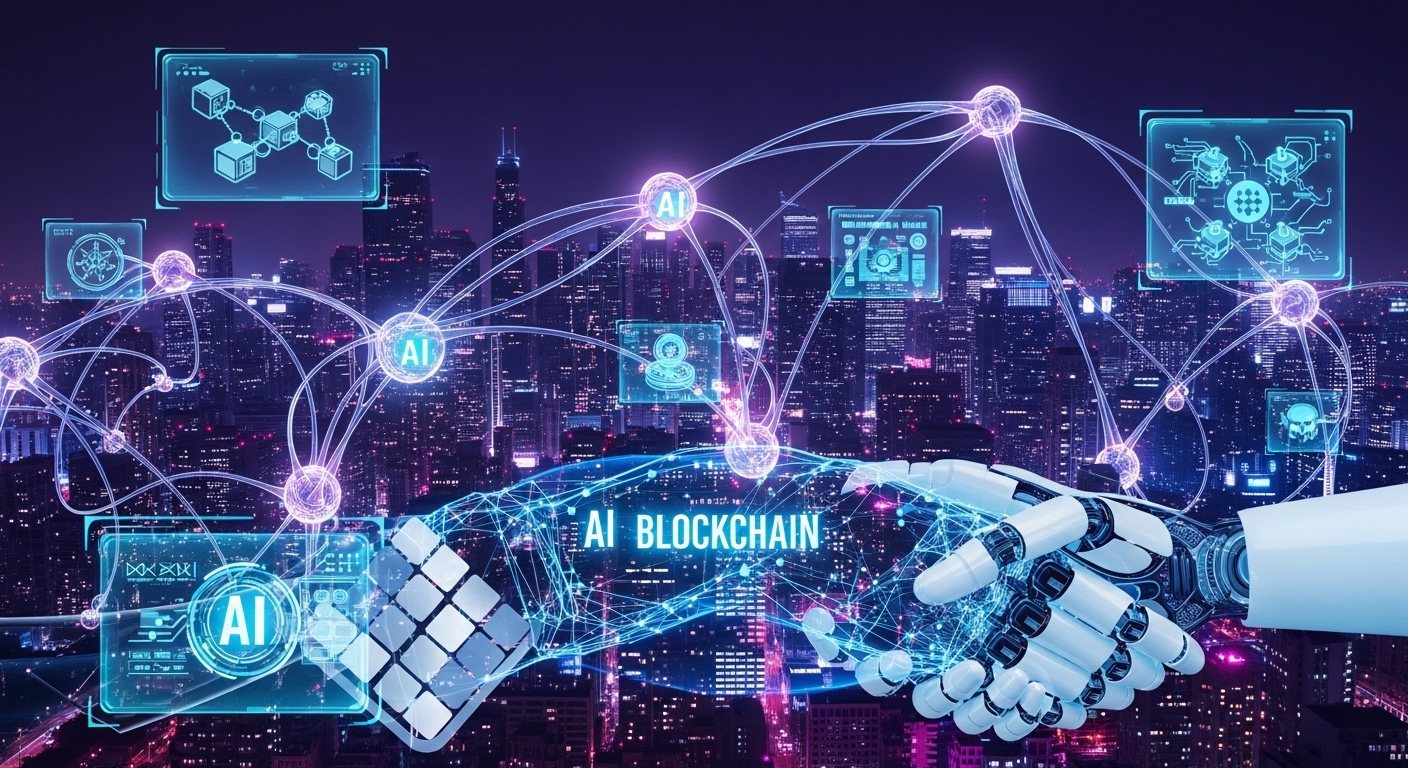AI Meets Blockchain: A Synergy Powering the Next Tech Revolution
Introduction
Artificial Intelligence (AI) and blockchain are no longer just futuristic buzzwords—they’ve evolved into foundational technologies driving innovation across industries. In 2025, AI and blockchain integration is enabling unprecedented levels of trust, transparency, and efficiency in sectors like finance, healthcare, supply chain, energy, and digital content (TMCnet).
What Makes AI and Blockchain an Effective Duo?
AI: Smarter Decision-Making
AI systems analyze vast datasets to make predictions, optimize processes, and mimic human judgement—faster and with greater precision. From predictive analytics in finance to diagnostics in healthcare, AI drives intelligent automation across domains.
Blockchain: Trust and Transparency
Blockchain delivers immutable and decentralized transaction records. It guarantees data integrity and auditability, making it ideal wherever trust is paramount.
The Convergence: Amplified Impact
In AI-blockchain integrations, blockchain ensures that training and transactional data is verifiable, while AI extracts intelligence from that certified data. Together, they enable systems that are both smart and trustworthy (Cryptowisser, GetBlock.io).
Real-World Applications
1. Finance & DeFi
In decentralized finance (DeFi), blockchain supports smart contracts—self-executing agreements with no intermediaries. AI layers on top, offering fraud detection, market forecasting, and personalized portfolio recommendations. This synergy is significantly improving transaction speed, reducing costs, and enhancing financial inclusion (Top AI Tools List – OpenTools, WebProNews, Cryptowisser).
2. Supply Chain & Logistics
Blockchain helps trace goods across the supply chain, from raw materials to retail. AI optimizes logistics, predicts demand, and identifies bottlenecks early. Retailers like Walmart already use blockchain for food traceability and AI to reduce waste—improving consumer trust and operational efficiency (ijsret.com, link.springer.com, blockchainhealthcaretoday.com).
3. Pharmaceuticals & Healthcare
Counterfeit medication remains a global challenge. Blockchain-based platforms such as MediLedger provide immutable drug provenance tracking, supporting regulatory compliance and counterfeiting prevention. AI systems analyze medical imaging, genomics, and supply data to improve diagnostics and predict drug shortages—an integrated approach that enhances patient outcomes and supply resilience (silicondigest.com).
4. Energy & Decentralized Trading
In energy networks, AI predicts generation and consumption trends, while blockchain enables peer-to-peer energy trading—letting individuals trade surplus solar or wind power securely and efficiently. Platforms like Power Ledger exemplify how this can reduce waste and democratize energy markets (WebProNews, Cryptowisser).
5. Digital Content & Intellectual Property
Content creators are using blockchain to record and verify ownership via NFTs, while AI tools help with creation and personalization. Additionally, blockchain can store provenance data for AI-generated media, addressing concerns around authenticity and copyright in the digital era (CryptoThreads, wired.com).
Emerging Trends in 2025
Tokenized AI Models & Decentralized Marketplaces
AI services are being tokenized on blockchain-powered marketplaces, democratizing access to advanced tools. Platforms like Singularity and NodeGoAI (a decentralized compute network supporting AI workloads) allow startups and small businesses to participate in the AI economy without depending on centralized providers (en.wikipedia.org).
AI Transparency via Blockchain
Concerns about “black-box” AI are being addressed by logging model decisions on immutable ledgers. This fosters auditability, accountability, and regulatory compliance in high-stakes domains like finance and healthcare (arxiv.org).
Privacy-Preserving Collaborations
New infrastructure like Cintara’s AI-native blockchain OS, in partnership with Secret AI, enables encrypted agent-to-agent interactions—preserving privacy while allowing complex workflows on-chain (dailyhodl.com).
Industry Momentum and Adoption
Industry surveys indicate that over half of organizations now actively integrate AI with blockchain, optimizing smart contracts, fraud prevention, and predictive analytics (OnChain Standard).
Challenges & Ethical Considerations
- Scalability: Blockchain networks grow rapidly over time, and AI requires massive data volumes. Balancing efficiency with performance is an engineering challenge (GetBlock.io, CryptoThreads).
- Data privacy and bias: AI using blockchain-logged data must preserve privacy, minimize bias, and adhere to ethical frameworks.
- Regulation and misuse: Governments and industry bodies are crafting guidelines to deter surveillance, illicit use of blockchain, and unchecked AI deployment.
Frameworks like ethical AI standards and blockchain transparency initiatives are emerging to guide responsible integration.
What Lies Ahead
The integration of AI and blockchain is already reshaping complex systems across finance, healthcare, logistics, energy, and creative industries. But this is just the beginning. Over the next decade, we’ll see innovations such as:
- Smart cities governed by AI agents operating on decentralized ledgers
- Tokenization of real-world assets reaching trillions in value
- Industry-agnostic AI marketplaces disrupting centralized cloud models
- Enhanced visibility into AI decision-making chains via blockchain audit logs (Top AI Tools List – OpenTools, en.wikipedia.org)
Conclusion
AI and blockchain are not just complementary technologies—they form a powerful union that is redefining trust, efficiency, and access across sectors. Their combined force is helping solve global-scale challenges and empowering industries to evolve toward greater transparency and innovation.
As the landscape continues to mature in 2025 and beyond, AI‑powered transparency and blockchain‑secured data may transform nearly every aspect of how we live, work, and create.
Key Takeaways
- AI enhances decision-making through predictive analytics and automation.
- Blockchain ensures secure, immutable data integrity and provenance.
- Together, they revolutionize industries—from finance to pharma to digital content.
- Emerging trends include decentralized AI marketplaces, explainable AI on-chain, and encrypted AI agents.
- Challenges remain, but frameworks are forming to support ethical and scalable solutions.
